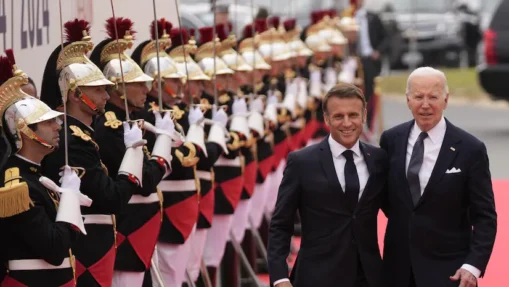June 2024
Transatlantic Relations Update: Blue skies for Paris-Washington ties, for now
Region: Europe
Region: Transatlantic Perspectives: Europe
Author: Lucie Gonçalves
A public show of unity between both Presidents, the state visit showed how far the bilateral relationship has come from its low point early in the Biden administration.
In the wake of the ceremonies of the 80th anniversary of the Normandy landings, just before the results of the European elections on June 9 and the ensuing political upheaval in France, French President Emmanuel Macron hosted President Biden in Paris for a State visit on the second weekend of June 2024. The visit sought to highlight the deep historic ties and shared values between France and the United States.
A public show of unity between both Presidents, the state visit showed how far the bilateral relationship has come from its low point early in the Biden administration. Back in 2021, Macron had gone so far as to recall his ambassador after the AUKUS deal cut France out of defense contracts worth billions. In Normandy, President Biden praised France as America’s “first friend” and “best ally”. He also reaffirmed the US commitment to Ukraine, pledging to “not walk away” during his remarks at the Normandy American Cemetery. In a joint roadmap published two days later, both countries expressed their intention to deepen bilateral cooperations, especially on economic, nuclear, space, and global health matters.
However, despite these positive outcomes, the relationship remains subject to significant uncertainty. After Macron called a snap election in early June, the far-right National Rally is leading the polls, opening the prospect of a far-right government in France. In addition, November could bring a far less Europhile administration into the White House. President Biden has already announced he would work with any new democratically elected leader of France and Macron was one of the EU’s biggest proponents of engagement with the first Trump administration. However, transatlantic unity on subjects ranging from Ukraine to trade and de-risking from China will be much harder to maintain with nationalist isolationists in power on either, or both, sides of the Atlantic.
